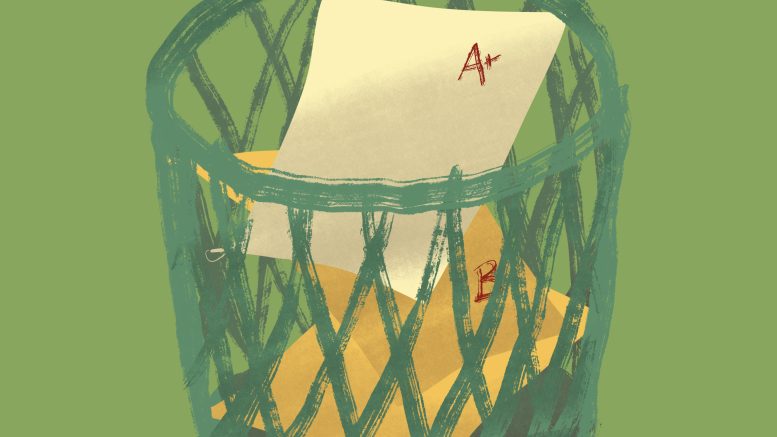With the chilly October breeze finding home in our bones, of course the time has come when our first grades are coming back.
In many cases, these grades are not the cozy blankets that keep us warm. They are the cold, unrelenting force that keeps us up at night. All fall, students have been working in hopes of receiving a big shiny “A” that fills us with the academic validation we all crave.
But that 92 per cent you got on that first treacherous linear algebra test was converted to a “B.” How could this happen?
This is the fault of the bell curve.
Professors who grade on a bell curve adjust students’ grades depending on the average grade of the rest of the class. The average looks like the round top of a bell when mapped onto a graph, with outliers on the edges looking like the bell’s lip.
While you worked hard to get that 92 per cent, let’s say five people got 93 per cent or higher and the professor only allows five students to get an “A” on that test. The professor would adjust your grade to reflect a bell curve.
In this case, your grade does not reflect the amount of time and effort you invested. Unfortunately, it will be the only indicator towards your final grade, and in turn your GPA.
Why do we define success as a competition within an institution that is meant to promote critical thinking and further education? Why do we punish students unfairly for successes and create arbitrary failure?
The answer is capitalism. University and capitalism have become intertwined at such a fundamental level it is disturbing. At the end of the day, with the university functioning more as a business rather than an institution for education, everything boils down to profits and value.
As Alfie Kohn wrote in his article “Why Can’t Everyone Get A’s,” the goal of achieving good grades “isn’t to do well but to defeat other people who are also trying to do well.” The desires for further education and developing critical thinking skills are not encouraged by this system because students are expected to regurgitate knowledge imprinted onto their brains without critical perspectives of that knowledge.
Rather than enjoying our education, we are put in direct competition with each other over arbitrary values that dictate all our lives and overall happiness.
According to Kohn, research has shown that “competition tends to hold us back from doing our best.” Competition creates “an adversarial mentality” that discourages “productive collaboration, encourages gaming of the system” and leads students to fixate on outdoing their peers rather than improving meaningfully.
This speaks directly to the Marxist perspective of competition which is a tool of oppression through fragmenting the working class. In this case, there is a fragmentation of student bodies which prevents the formation of meaningful connections, alienating us from others and ourselves.
One question remains that always follows discussions of capitalism: how do we get out?
Ungraded classes are being adopted and implemented in classes, even at the University of Manitoba. These courses do not use grades throughout the course. Rather, they function on a complete or revise and resubmit model. Ungrading encourages the student to develop their writing and thinking skills rather than focusing on submitting a paper, receiving a grade and soon forgetting about it.
This model promotes productive education that prioritizes critical thinking. It values students’ own creative and critical engagement with material rather than seeking out a pre-determined image.
Perhaps making things better could be the first step. If grades cause overwhelming anxiety and depression, maybe we should do away with them entirely. We should not be sacrificing ourselves for an arbitrary letter that does not equate to our effort and value.
Maybe valuing ourselves by our own standards rather than an arbitrary letter can lead to different types of production that are rooted in curiosity, connection and imagination.





